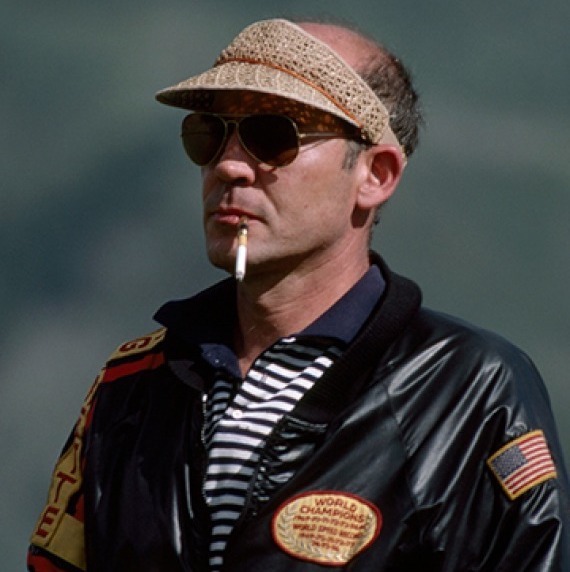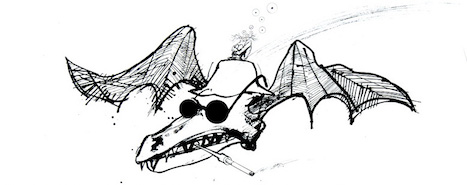"Farewell Hunter" by Ralph Steadman
Long-time friend Ralph Steadman is the satirical cartoonist who illustrated several of Hunter S. Thompson’s books, including “Fear and Loathing in Las Vegas.” This remembrance originally appeared in the British newspaper The Independent.

Farewell Hunter
by Ralph Steadman
“I would feel real trapped in this life if I didn’t know I could commit suicide at any time,” he told me many years ago, and I knew he meant it. It wasn’t a case of if but when. He didn’t reckon he would make it beyond 30, anyway, so he lived it all in the fast lane. There were no first, second, third and top gears in a car – just overdrive. He was in a hurry. Drive your stake into a darkened heart in a red Mercedes Benz. The blackness hides a speeding tramp. The savage beast pretends. But never mind the nights, my love, because they never really happened anyway. So we wrote in a Beverly Hills house one drunken night. I wrote the stanzas – he wrote the chorus. Don’t write, Ralph, he said. You’ll bring shame on your family.
“Those Weird and Twisted Nights.” That was the song.
Yesterday morning, Sunday, I had just finished signing the 1,200 limitation pages for a Taschen version of “The Curse of LONO,” which Hunter had signed so uncharacteristically – obedient and mechanical, over the month of December. I thought that was very strange. He has to be cajoled like a child to do anything like that, so I drew his portrait across the last sheet, glaring out, his two eyes in the two O’s of LONO, put the cigarette holder with the long Dunhill prodding upwards in his grimacing mouth, signed it with and extra flourish and closed the last of the four boxes. The old bastard! He waited to make sure I had finished the task, then he signed himself off. I knew it was too good to be true. Now I will be expected the build the monstrous cannon in Woody Creek, a hundred-foot-high column of steel tubes, with the big red fist on its top and his ashes placed in a fire bomb in its palm. Two thumbs, Ralph! Don’t forget the two thumbs!!
It was the Gonzo fist and he really believes I can do it! Such were his demands as he tipped at his windmills. People were fucking with his beloved Constitution, and he was born to banish the geeks who were doing it. In that way, he was a real live American. A pioneer, frontiersman, last of the cowboys, even a conservative redneck with a huge and raging mind, taking the easy way out and mythologizing himself at the same time.
He spent a lot of his early years of rejection writing, verbatim, excerpts from Hemingway, Faulkner and Conrad, trying to imagine what it was like to write some classic text. He could be very persuasive. As a boy, he was hired by the milkman to collect outstanding bills from the citizens of Louisville, Kentucky, but he was shunned by his neighbours and, especially, the literary establishment in the town, so he had a score to settle.
I had only just arrived in America in late April of 1970, and was staying with a friend in the Hamptons to decompress. I got a call from JC Suares, art editor of Scanlan’s magazine in New York. He said, “How’d ya like to go to the Kentucky Derby with an ex-Hell’s Angel who just shaved his head and cover the race? His name is Hunter S. Thompson and he wants an artist to nail the decadent, depraved faces of the local establishment who meet there. He doesn’t want a photographer. He wants something weird and we’ve seen your work.”
The editor, Don Goddard, had been the New York Times foreign editor and he thought I was naive enough to take this on. I was looking for work – so I went. Finding Hunter or, indeed, anyone covering the prestigious Kentucky Derby who is not a bona fide registered journalist, was no easy matter; and trying to explain my reasons for being there was even worse, especially as I was under the impression that this was an official trip and I was an accredited press man. Why shouldn’t I think that? I assumed that Scanlan’s was an established magazine.
I had been watching someone chalk racing results on a blackboard while I sipped a beer, and I was about to turn and get myself another when a voice like no other I had ever heard cut into my thoughts and sank its teeth into my brain. It was a cross between a slurred Karate chop and gritty molasses.
“Um . . . er you . . . er . . . wouldn’t be from England . . . er . . . would you . . . er . . . an artist . . . maybe . . . er . . . what the!!”
I had turned around and two fierce eyes, firmly socketed inside a bullet-shaped head, were staring at a strange growth I was nurturing on the end of my chin. “Holy shit!” he exclaimed. “They said I was looking for a matted-haired geek with string warts and I guess I’ve found him.”
We took a beer together and sat in the press box. Somehow, he had got our accreditation and we were in. He asked me if I gambled and I said, only once in 1952. I put two shillings on Early Mist to win in our Derby, and I did. I picked a horse but didn’t bet and it won, so then I picked another, backed it with a dollar, and lost. “That’s why I don’t gamble,” I said.
“I thought you had been picked up,” he replied.
“Picked up??” I didn’t quite understand.
“Er . . . yes. The police here are pretty keen. They tend to take an interest in something different. The . . . er . . . um . . . the beard. Not many of them around these parts. Not these days, anyway.”
I was beginning to take in the whole of the man’s appearance, and his was a little different, too. Certainly not what I was expecting. No time-worn leather, shining with old sump oil. No manic tattoo across a bare upper arm, and strangely no hint of menace. This man had an impressive head chiselled from one piece of bone, and the top part was covered down to his eyes by a floppy-brimmed sun hat. His top half was draped in a loose-fitting hunting jacket of multi-coloured patchwork. He wore seersucker blue pants, and the whole torso was pivoted on a pair of huge white plimsolls with a fine red trim around the bulkheads. Damn near 6-foot-6 of solid bone and meat holding a beaten-up leather bag across his knee and a loaded cigarette holder between the arthritic fingers of his other hand.
Arthritis was to plague him all his life, as was the football knee injury which left him with one leg shorter than the other. But it never truly encumbered his physical rage or his action-packed approach to a deep respect and love of writing – and righteousness.
We found the decadent, depraved faces of Louisville by the end of the first week we spent together. They were staring at us from a mirror in the gent’s toilet on the infield, where the rest of the riffraff, who are not eligible to stand in the privileged boxes of the chosen few, spent their time at the races, just like us.
We spent many assignments together, bucking the trend, against the cheats and liars, the bagmen and the cronies – me, an alien from the old country; and him raging against the coming of the light. “Fuck them, Ralph,” he would say. “We are not like the others.”
Well, he wasn’t anyway, but I was easily led. Before “Fear and Loathing in Las Vegas” we tried to cover the America’s Yacht Race in Rhode Island for Scanlan’s (who were just about to go bust and get onto Richard Nixon’s blacklist), from a three-masted schooner, a rock band on board for distraction, booze and, for Hunter, whatever he was gobbling at the time. I was seasick and Hunter was fine. I asked him what he was taking and he gave me one. It was psilocybin, a psychedelic hallucinogen, my first and only drug trip apart from Librium.
I was the artist from England, so I had a job to do. He handed me two spray paint canisters.
“What do I do with these?”
“You’re the artist, Ralph. Do what you want, but you must do it on the side of one of those multi-million dollar yachts, moored hardly 50 yards away from where we are.”
“How about FUCK THE POPE?” I said, now seeing in my mind red snarling dogs attacking a musician singing at a piano dressed as a nun at a shore-bound bar.
“Are you a Catholic, Ralph??”
“No,” I replied. “It’s just the first thing that came to mind.”
So that was the plan and we made it to the boats and I stood up in the little dinghy with the spray cans and shook them, as one does. They made a clicking sound and alerted a guard. “We must flee, Ralph! There’ll be pigs everywhere. We have failed.”
He pulled fiercely on the oars and fell backwards with legs in the air. He righted himself and started rowing again. We made it back to our boat; and then while I was gabbling insanely, he was writing down all the gibberish that I uttered. I was now a basket case and we had to get back to shore and flee. Hunter shot off two Leery distress flares into the harbour and we hailed a boat just coming in. The flares set fire to one of the boats, causing an emergency fire rescue as we got to dry land.
There’s more and I won’t go on, but I guess that was the genesis of “Fear and Loathing in Las Vegas.”
Such a wild game was possible, but it needed all the genius and application of Hunter S. Thompson to make it live. He has done that and he has proved that a redneck Southern gentleman who has the fire in his belly and the indignation in his soul can make it happen. I had the good fortune to meet one of the great originals of American Literature. Maybe he is the Mark Twain of the late 20th Century. Time will sort the bastard out. I have always known that one day I would know this journey; but yesterday, I did not know that it would be today . . .
I leave it to others more qualified than me to assess and appraise his monumental literary legacy.
